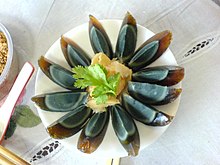Millennial eggs
Millennial eggs , centenary eggs or Chinese eggs ( Chinese 皮蛋 , pinyin pídàn - "leather eggs" or 松花蛋 , sōnghuādàn - " pine pattern eggs") are fermented eggs, a delicacy of Chinese cuisine . These are eggs preserved by aseptically protected autolysis .
For production, raw duck eggs , rarely chicken eggs , are placed in a paste made from aniseed , Szechuan pepper , tea leaves , pine needles , fennel seeds , salt, warm water, quick lime , wood ash and sawdust for about three months . During this time, the egg white turns into a gelatinous, amber-colored mass, the egg yolk takes on a quark-like consistency and turns green. However, there are different ways of preserving food, with the ingredients used differing slightly. Mixtures of ash, salt, lemon and tea are also frequently used.
Millennial eggs can be kept for months without refrigeration (up to 3 years are possible). In China a distinction is made between two types of these eggs: with firm or only semi-firm yolks. “The semi-firm yolk has a pleasant, light taste with no pungent lemon aroma and no aftertaste. […] Pidan with hard yolk have a slightly pungent, somewhat salty taste and a lingering aftertaste. ”They are served as a starter or snack with soy sauce , vinegar and ginger , or as an ingredient in congee .


